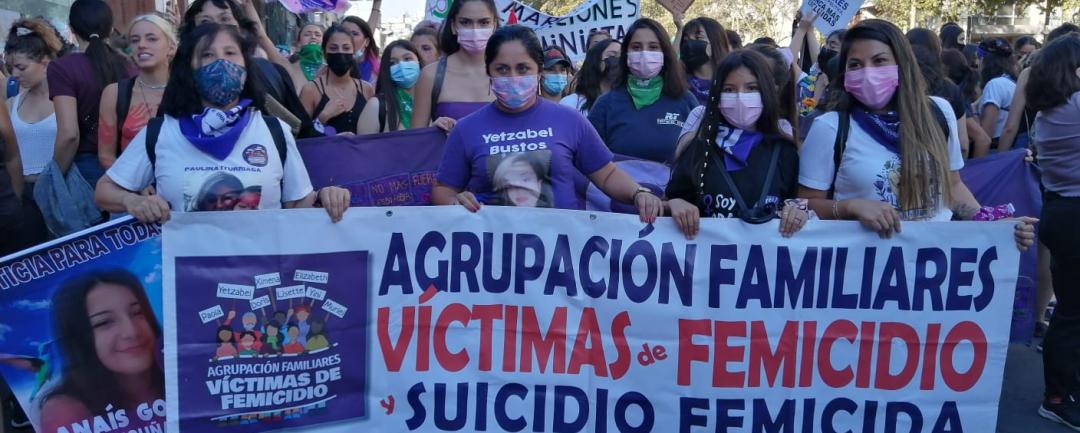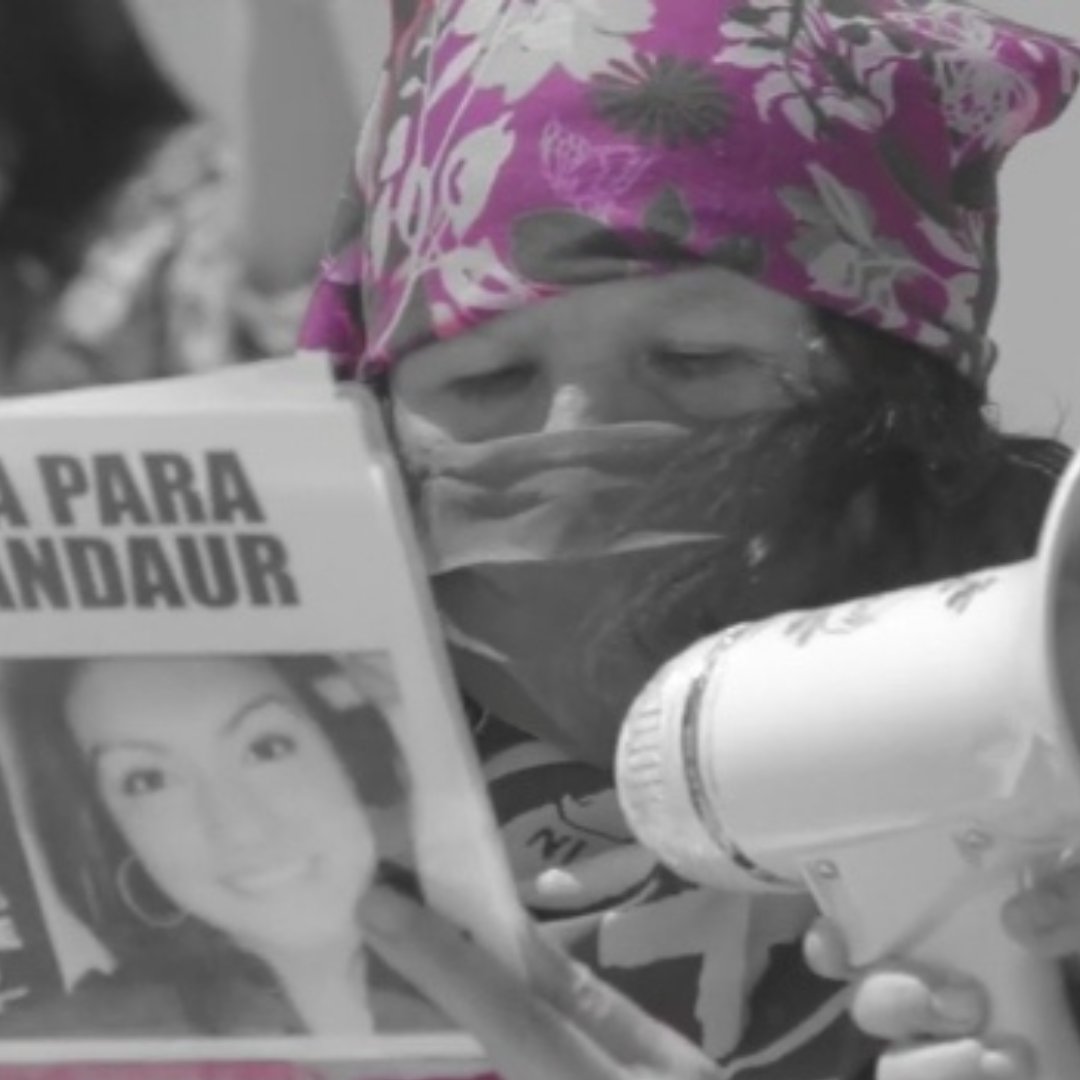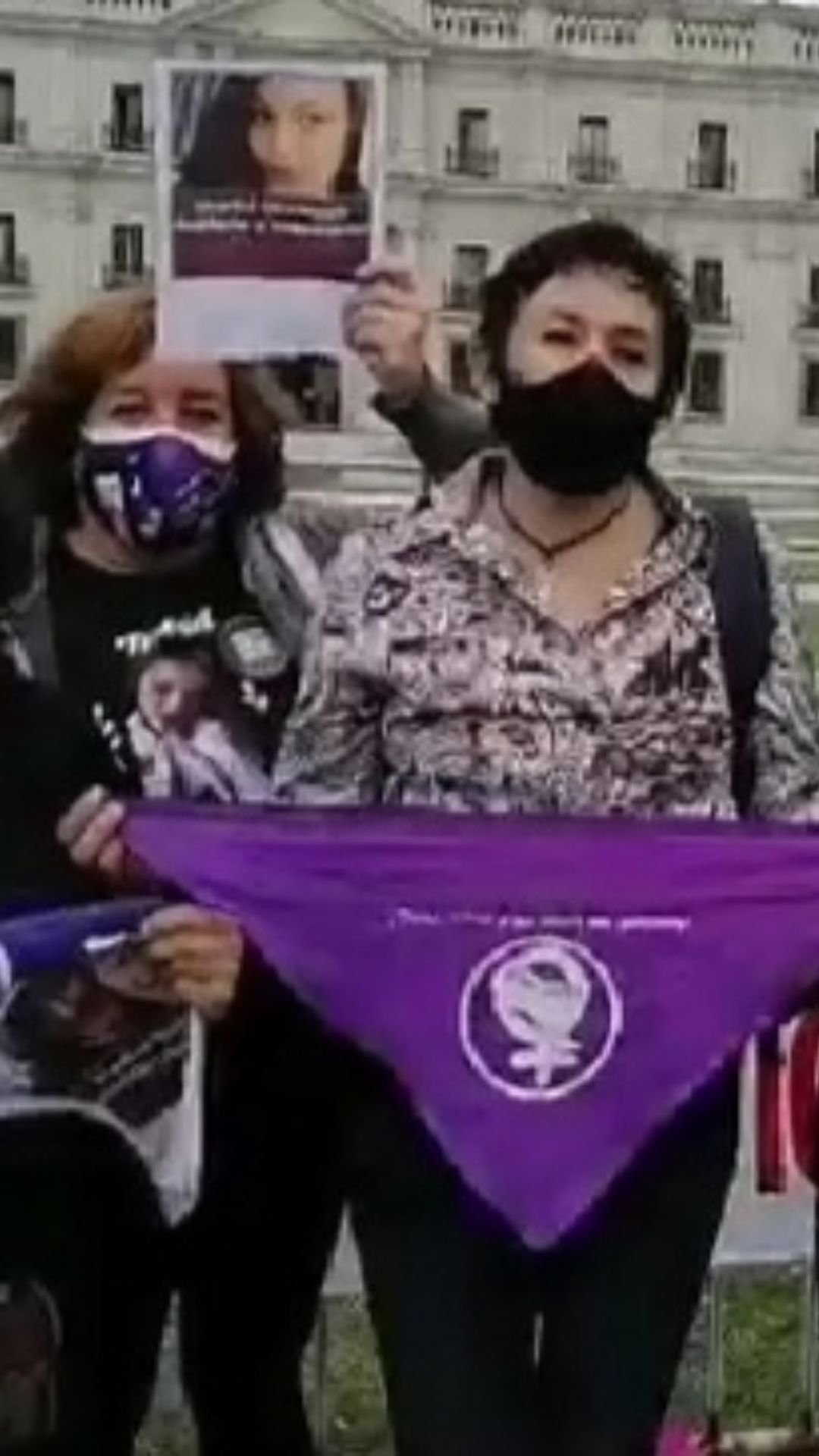
On November 25, 2019 they came to light. It was commemorating another year of the International Day for the Elimination of Violence Against Women and Chile was going through the biggest social outbreak in its recent history. There, in the Plaza de la Dignidad in Santiago, a group of people led by women displayed a canvas that read: Group of Relatives of Victims of Femicide. That day, the canvas did more than attract attention: it was a message that reminded that for every murdered woman there is a life intertwined with many lives, families and entire communities.
That day they became the first Association of Relatives of Victims of Femicide in Chile and the second in Latin America, after the organization with the same name in Argentina. This effort was added to that made by the Coordinadora 19 de Diciembre, founded in 2018 with the aim of establishing December 19 of each year as Day Against Femicide -achieved in 2020- in memory of Javiera Neira Oportus, murdered at the age of 6 by his biological father in the context of the frustrated femicide of his mother in 2005.
A couple of months before that day in the Plaza de la Dignidad, the Group had its first meeting encouraged and supported by the Coordinator Ni Una Menos and by the Chilean Network Against Violence against Women. “The compañeras invited us to that first meeting to recognize and agree. We were very few. There was Alda Reyes, the mother of Yini Sandoval, murdered along with her three children, ages 2, 5, and 10, in a fire in Temuco; Maria Bahamondes, first cousin of Nicole Saavedra, kidnapped, raped and murdered in Limache: Carol, sister of Doris Andaur, who were passing off her femicide as suicide in Santiago; and Ana Fuentes, Yetzabet Bustos's aunt, murdered by her partner in Renca,” recalls Julieta Rivera, a feminist activist, Paulina Iturriaga's aunt murdered along with her 4-year-old son in Maipú, and one of the organization's spokespersons.
Shortly after, Julieta met Nancy Cortez -mother of Paola Alvarado, murdered in Curacautín and made to disappear- and they made the canvas that illuminated the Plaza de la Dignidad on November 25 and that -until today- they keep as a relic. As if she still contained the affection with which her lyrics were written and because it became an emblem of her fight for justice for her daughters, sisters, cousins, companions. Also because it has accompanied them to tour the cities and when it spreads it seems that it unites the geography in the same territory.
[3 Photos]
Activism, territory and mutual support
In the first months of the organization, its goal was to be a meeting place for families. Where they could come together, recognize each other's experiences, and hold together. "There we realized that all those pains, those rages, those impotence, that lack of justice and abandonment of the State and the institutions were the common denominator for all of them."

The cases of Doris Andaur, Ximena Cortés and, particularly, that of Paola Alvarado were key to the development of her activism. “Nancy immediately traveled to look for Paola, her missing daughter. We traveled to accompany her and participated for days in the search work. There we realized that we were the Association of Relatives Victims of Femicides Chile, that is, that we represented all the families in the country, not in number but in the quality of the fight that we were giving (...) In addition, we realized that that building an organization was the only way to not be alone”, says Julieta.
In the same way, the crusade that Nancy was holding in Curacautín added support that crossed the territory and the community. "Nancy stood alone in front of the Prosecutor's Office and one day some girls went to look for a friend and they told her 'look there is a mother who is alone, why don't you lend her the speaker and we are going to support her' and they lent her the equipment and to this day they are accompanying her. They are little girls without a political party, feminists, girls who wear the handkerchief, from school, and some who entered the university”, she recounts.
With this impulse, the Association has traveled north, center and south. They have been in Temuco and Lautaro, in Vicuña for the case of Anais Godoy, in Caldera for the femicide of Gisela Ávila, in Antofagasta and Mejillones to accompany Ruth, the mother of Ximena Cortés, and in Copiapó to accompany the families of Marina Cabrera, Sussy Montalvan, and Catalina Alvarez.
All this journey they have done with the solidarity of compañeras who open the doors of their homes for them, who receive them and accompany them on their paths. “They are ordinary people who live from day to day. We arrive at those houses and they open us up as if they knew us from before without knowing about us. There it is happening, in sorority. They and they realize that these women exist, that we are not important, we are not the ministers, nor the councilors: we are ordinary women who lost a relative and decided to fight. We are not heroines, we are simply relatives who are shouting with rage, demanding justice”, reflects Julieta.

This journey through towns, fields and cities has led them to twin with women's organizations and feminist networks. There they accompany and support each other to amplify their voices and go through the hard path of demanding justice together. “We arrived at those spaces as what we are; We are the relatives, we are the mothers telling the stories of each of our relatives, telling the reality of thousands of women, with a story”.

In these meetings, the organizations accompany them to the courts, give talks, conversations and workshops. Regarding the impact of these alliances, Julieta affirms: “I felt alone, but today I realize that I am not alone because they are there, because you are there. That leaves you with a feeling that this work that we are doing, which is born in the heat of our work doing justice, is really coming out, advancing. And it's growing, it's adding up. As a performer we are evolving in our activism, in our struggle”.
In this evolution, the Association's objectives were expanded when encountering new challenges. In addition to making the cases visible, they had to build articulation in the territories “because when there is a femicide that has a public connotation and appears in the media, there is a tremendous abuse of the media, a disease. On the other hand, if it does not appear in the media -because it does not sell, because it does not have a rating-, it is a femicide that remains there, in impunity”, explains Julieta before recalling that since the law that recognizes femicide came into force in 2010 there have been more than 700 murdered.
“I believe that Chilean women and the world are warrior women in all latitudes, giving birth and raising your children alone, you are already a warrior. Having to bring livelihood to the house, having to live with a violent person and survive. I believe that there is no woman neither first nor second. We are those women. We don't need nice words, or give a press conference. Let's bring our strength, our energy, our sorrow for our companions, but also our joy because we do everything with joy. It is necessary because Santiago is not Chile, here is the epicenter but if we go to the provinces the families are alone. That is why organizations are super important”.
Julieta Rivera, spokesperson for the Association of Relatives of Victims of Femicide.

A historic bill
On January 15, 2021, the bill establishing a comprehensive protection and reparation regime for victims of femicide and their families was presented. The project is considered a substantial advance for the families of victims of femicide and for feminist organizations that work for a life free of violence against women. Julieta says that both they and Ni una menos Chile were able to participate directly in the creation of the bill, recounting what they had experienced and commenting on the articles of the bill.
This November 21, it was voted in the Chamber of Deputies and was approved by 88 votes in favor and 27 abstentions coming from all the deputies of the Republican Party, and some from the UDI, RN and Evópoli. Currently it was returned to the Gender Commission due to a series of indications made by the parliamentarians Johannes Kaiser and Chiara Barchiesi who seek to suppress the references to gender contained in the law.
However, the overwhelming majority that the project obtained keeps the Association hopeful. “I think this is going to be historic because, although not in its entirety, some justice is going to be done. Our deaths, our cases are in that bill.”

Like Nicole Saavedra and Maria Pavez. Of their kidnappings, article 2 was classified, which establishes that in cases of disappearance of women, the Public Ministry, the Courts of Justice, Carabineros de Chile and the Investigative Police of Chile, will initiate all efforts to search for them, in the within the scope of their powers, within a maximum period of 24 hours after the family reports their disappearance.
Like Joane Florvil, a migrant woman and mother. Article 8 was created, which grants a special right to migrant victims, declaring that neither they, nor their dependent or close relatives, will be deported or deported regardless of their immigration status and granting them without exclusion or conditions all the rights guaranteed in this law.
Like Doris Andaur and Ximena Cortés , murdered by members of the police and armed forces. Article 3 was established, on the principle of impartiality, which states that all public and private institutions and organizations must strictly respect the principle of impartiality in the investigation, judicial proceedings, and in all efforts related to the victims of femicide, prohibiting the use of institutional resources for the defense of investigated and accused.
Like Elizabeth , that her femicide kept her inheritance and used it to defend herself in court. From his story comes paragraph 3 of article 9 that prohibits the femicide from inheriting the assets of his murdered wife.
Like Alda who was fired from her job while on psychiatric leave while seeking justice for her daughter Yini Sandoval and her three grandchildren. This is where Article 7 comes from, which enshrines the right to protection at work, granting labor jurisdiction, regardless of the contractual quality they hold, throughout the investigation and procedure and up to one year after the sentence.
Like all the girls, boys and adolescents who lost their mothers due to femicide . For them, Article 9 was created, which annuls the parental rights of femicides with respect to their children, which includes parental authority, personal care, and guardians, whether or not they are daughters or sons of the victim. Article 10 was also enshrined for them, which grants the responsibility of the State in their protection and grants them the right to comprehensive health care, dignified and adequate housing; and free and quality education at all levels.
This last area of protection is particularly relevant for Julieta: “Our children stay with their grandmothers, with their relatives. And it's not easy. Imagine that these children have to come to a house, even if they are familiar, to share with other children, with other customs. Maybe those were little, or they were crafty or they were spoiled or they went to bed late, and they have to abandon all their customs, their houses, many times their things. And for families it is also difficult financially. It was not included in this bill -because everything that has to do with the budget scares parliamentarians- but now they are asking for a pension for those children, to support the relatives who take care of it until they are older of age or have finished studying”, he assures.
This November 25, the Association of Relatives of Victims of Femicides will not go to the march in downtown Santiago. Days before they traveled to the territories to commemorate the date where it is most needed.







